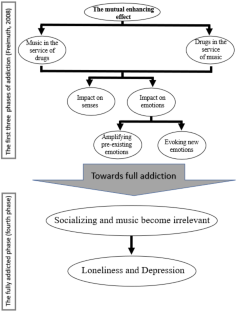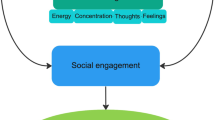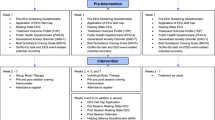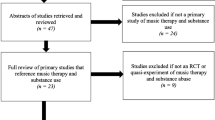Abstract
Substance craving may be triggered in people recovering from substance use disorder when listening to the same music genres they had listened to during active addiction. Given the limited research on this topic, this study examined how the combination of music and drugs facilitate addiction among people with active addiction and the role of music within this phenomenon. This phenomenological study included semi-structured interviews with 36 non-active addiction participants. Content analysis was employed to reveal themes and sub-themes regarding participants’ views on the role and meaning of music during active addiction. Interview analysis revealed two main themes. The mutual enhancing effect theme relates to participants’ utilization of music in service of the drug and vice versa. This mutual enhancing effect had an impact on sharpening sensory abilities and the mood participants wanted to amplify or evoke. The full addiction and music theme relates to a timepoint during active use, when music ceased to be relevant, and drugs dominated the entire experience. Participants reported down spiraling into their abuse, seeking seclusion and feeling lonelier and more depressed. The findings are discussed in light of theories in addiction and psychology of music. Rehabilitative implications are suggested.

Similar content being viewed by others
Data Availability
Data for this qualitative study include interview transcripts and are not publicly available because of participant identifying information included in the transcripts. Upon request, the corresponding author can provide blinded interview transcript excerpts that are not already included in the manuscript results section.
References
American Psychiatric Association (2022). Diagnostic and statistical manual of mental disorders (5th ed., text rev.). American Psychiatric Association.
Archibald, M. M., Ambagtsheer, R. C., Casey, M. G., & Lawless, M. (2019). Using zoom videoconferencing for qualitative data collection: Perceptions and experiences of researchers and participants. International Journal of Qualitative Methods, 18, 1–8. https://doi.org/10.1177/1609406919874596.
Buttram, M. E., Pagano, M. E., & Kurtz, S. P. (2018). Residential proximity to electronic dance music nightclubs and associations with substance use, sexual behaviors, and related problems. Journal of Drug Issues, 48(1), 4–16. https://doi.org/10.1177/0022042617726075.
Childress, A. R., Ehrman, R., Rohsenow, D. J., Robbins, S. J., & O’Brien, C. P. (1992). Classically conditioned factors in drug dependence. In J. Lowinson, P. Ruiz, & R. B. Millman (Eds.), Substance abuse: A comprehensive text (pp. 56–69). Williams and Wilkins.
Cohen, N., & Arieli, T. (2011). Field research in conflict environments: Methodological challenges and snowball sampling. Journal of Peace Research, 48(4), 423–435. https://doi.org/10.1177/0022343311405698.
Connelly, L. M. (2016). Trustworthiness in qualitative research. Medsurg Nursing, 25(6), 435–436.
Cunningham, P. J., Felland, L. E., Ginsburg, P. B., & Pham, H. H. (2011). Qualitative methods: A crucial tool for understanding changes in health systems and health care delivery. Medical Care Research and Review: MCRR, 68(1), 34–40. https://doi.org/10.1177/1077558710385468.
DeNora, T. (2000). Music in everyday life. Cambridge University Press. https://doi.org/10.1017/cbo9780511489433.
Dingle, G. A., Kelly, P. J., Flynn, L. M., & Baker, F. A. (2015). The influence of music on emotions and cravings in clients in addiction treatment: A study of two clinical samples. The Arts in Psychotherapy, 45, 18–25. https://doi.org/10.1016/j.aip.2015.05.005.
Edri, O., & Bensimon, M. (2019). The role of music among prisoners and prison staff: A qualitative research study. European Journal of Criminology, 16(6), 633–651. https://doi.org/10.1177/1477370818775295.
El-Guebaly, N. (2012). The meanings of recovery from addiction: Evolution and promises. Journal of Addiction Medicine, 6(1), 1–9. https://doi.org/10.1097/adm.0b013e31823ae540.
Fachner, J. (2011). Drugs, altered states and musical consciousness: Reframing time and space. In D. Clarke, & E. Clarke (Eds.), Music and consciousness: Philosophical, psychological, and cultural perspectives (pp. 263–280). Oxford University Press. https://doi.org/10.1093/acprof:oso/9780199553792.003.0074.
Freimuth, M. (2008). Addicted? Recognizing destructive behaviors before it’s too late. Rowman & Littlefield Publishers. https://doi.org/10.1177/102986490300700201.
Gray, L. M., Wong-Wylie, G., Rempel, G. R., & Cook, K. (2020). Expanding qualitative research interviewing strategies: Zoom video communications. The Qualitative Report, 25(5), 1292–1301. https://nsuworks.nova.edu/tqr/vol25/iss5/9.
George, O., & Koob, G. F. (2017). Individual differences in the neuropsychopathology of addiction. Dialogues in Clinical Neuroscience, 19(3), 217–219. https://doi.org/10.31887/DCNS.2017.19.3/gkoob.
Greasley, A. E., & Lamont, A. (2011). Exploring engagement with music in everyday life using experience sampling methodology. Musicae Scientiae, 15(1), 45–71. https://doi.org/10.1177/1029864910393417.
Horesh, T. (2006a). Dangerous music – working with the destructive and healing powers of popular music in the treatment of substance abusers. In D. Aldridge, & J. Fachner (Eds.), Music and altered states – consciousness, transcendence, therapy and addiction (pp. 125–139). Jessica Kingsley.
Horesh, T. (2006b). Music is my whole life’: The many meanings of music in addicts’ lives. Music Therapy Today: A Quarterly Journal of Studies in Music and Music Therapy, 7, 297–317.
Horesh, T. (2010). Drug addicts and their music: A story of a complex relationship. In D. Aldridge, & J. Fachner (Eds.), Music therapy and addictions (pp. 57–74). Jessica Kingsley.
Hughes, C. E., Moxham-Hall, V., Ritter, A., Weatherburn, D., & MacCoun, R. (2017). The deterrent effects of australian street-level drug law enforcement on illicit drug offending at outdoor music festivals. International Journal of Drug Policy, 41, 91–100. https://doi.org/10.1016/j.drugpo.2016.12.018.
Inanlou, M., Bahmani, B., Farhoudian, A., & Rafiee, F. (2020). Addiction recovery: A systematized review. Iranian Journal of Psychiatry, 15(2), 172–181.
Iversen, L. (2008). Speed, ecstasy, ritalin: The science of amphetamines. Oxford University Press. https://doi.org/10.1192/bjp.191.4.366a.
Juslin, P. N., & Laukka, P. (2004). Expression, perception, and induction of musical emotions: A review and a questionnaire study of everyday listening. Journal of New Music Research, 33(3), 217–238. https://doi.org/10.1080/0929821042000317813.
Juslin, P. N., & Sloboda, J. (2010). Handbook of music and emotion. Oxford University Press.
Juslin, P. N., & Västfjäll, D. (2008). Emotional responses to music: The need to consider underlying mechanisms. Behavioral and Brain Sciences, 31, 559–575. https://doi.org/10.1017/S0140525X08005293.
Kam, J. A., Wang, N., & Harvey, J. (2014). Latino and european american early adolescents’ exposure to music with substance-use references: Examining parent-child communication as a moderator. Journal of Adolescence, 37, 185–196. https://doi.org/10.1016/j.adolescence.2013.12.001.
Koelsch, S., Maess, B., Grossmann, T., & Friederici, A. D. (2003). Electric brain responses reveal gender differences in music processing. Neuroreport, 14, 709–713. https://doi.org/10.1097/00001756-200304150-00010.
Lozon, J., & Bensimon, M. (2014). Music misuse: A review of the personal and collective roles of “Problem Music”. Aggression and Violent Behavior, 19(3), 207–218. https://doi.org/10.1016/j.avb.2014.04.003.
Ludwig, A. M. (1986). Pavlov’s “bells” and alcohol craving. Addictive Behaviors, 11(2), 87–91. https://doi.org/10.1016/0306-4603(86)90032-8.
MacDonald, E., & Saarti, J. (2020). Drugs and popular music: Shake your nerves and rattle your brain. University of Eastern Findland.
Mathis, W. S. (2015). The neuroscientific basis for aesthetic preference as an intervention for drug craving associated with addiction. Addiction Research and Therapy, 6(1–9), https://doi.org/10.4172/2155-6105.1000213.
Miller, E. M., Kelley, B. M., Midgett, C., & Parent, C. (2016). Substance use references in college students’ diverse personal music libraries predicts substance use behavior. Cogent Psychology, 3(1), 1–11. https://doi.org/10.1080/23311908.2016.1220446.
Mohr, A. A., Friscia, M., Logan, B. K., & Yeakel, J. K. (2017). Use of synthetic stimulants and hallucinogens in a cohort of electronic dance music festival attendees. Forensic Science International, 282, 168–178. https://doi.org/10.1016/j.forsciint.2017.11.017.
Moustakas, C. (1994). Phenomenological research methods. Sage Publications. https://doi.org/10.4135/9781412995658.
North, A. C., & Hargreaves, D. J. (2006). Problem music and self-harming. Suicide and Life-Threatening Behavior, 36, 582–590. https://doi.org/10.1521/suli.2006.36.5.582.
North, A. C., & Hargreaves, D. J. (2007). Lifestyle correlates of musical preference: Relationships, living arrangements, beliefs, and crime. Psychology of Music, 35, 58–87. https://doi.org/10.1177/0305735607068888.
O’Brien, B. C., Harris, I. B., Beckman, T. J., Reed, D. A., & Cook, D. A. (2014). Standards for reporting qualitative research: A synthesis of recommendations. Academic Medicine, 89(9), 1245–1251. https://doi.org/10.1097/acm.0000000000000388.
Oberle, C. D., & Garcia, J. A. (2015). Predicting alcohol, cigarette, and marijuana use from preferential music consumption. Journal of Drug Education, 45, 113–125. https://doi.org/10.1177/0047237915607283.
Oliffe, J. L., Kelly, M. T., Montaner, G., G., & Yu Ko, W. F. (2021). Zoom interviews: Benefits and concessions. International Journal of Qualitative Methods, 20, 1–8. https://doi.org/10.1177/16094069211053522.
Palaganas, E. C., Sanchez, M. C., Molintas, V. P., & Caricativo, R. D. (2017). Reflexivity in qualitative research: A journey of learning. Qualitative Report, 22(2), 426–438. https://doi.org/10.46743/2160-3715/2017.2552.
Silverman, M. J., Bourdaghs, S., Abbazio, J., & Riegelman, A. (2021). A systematic review of music-induced substance craving. Musicae Scientiae, 1–39. https://doi.org/10.1177/10298649211030314.
Skinner, M. D., & Aubin, H. J. (2010). Craving’s place in addiction theory: Contributions of the major models. Neuroscience and Biobehavioral Reviews, 34, 606–623. https://doi.org/10.1016/j.neubiorev.2009.11.024.
Sloboda, J. A., & O’neill, S. A. (2001). Emotions in everyday listening to music. Music and Emotion: Theory and Research, 8, 415–429. https://doi.org/10.1093/acprof:oso/9780199230143.003.0018.
Smith, L. J., Aycock, C., Hook, K., Chen, P., & Rueger, S. Y. (2017). Parental monitoring moderates the relation between radio exposure and adolescent alcohol and tobacco use: Preliminary findings from a national survey. Journal of Child & Adolescent Substance Abuse, 26, 314–323. https://doi.org/10.1080/1067828X.2017.1305933.
State of Israel Comptroller’s Report (2022). Social criticism: the local authorities’ handling of the drug and alcohol phenomena in their area. https://www.mevaker.gov.il/sites/DigitalLibrary/Documents/2022/Shilton/2022-Shilton-303-Alcohol-Druds.pdf?AspxAutoDetectCookieSupport=1 [in Hebrew].
Strauss, A. L. (1987). Qualitative analysis for social scientists. Cambridge University Press.
Tiffany, S. T., & Conklin, C. A. (2000). A cognitive processing model of alcohol craving and compulsive alcohol use. Addiction, 95(S2), S145–S153. https://doi.org/10.1046/j.1360-0443.95.8s2.3.x.
UNODC (2022). UNODC research - data portal – drug use & treatment. https://dataunodc.un.org/dp-drug-use-prevalence.
Van de Ree, M. (2016). Music as a trigger for craving: Exploring the phenomenon and possible music therapy approaches from a client and music therapist perspective [Master’s Thesis, University of Jyväskylä].
Van Manen, M. (2016). Researching lived experience: Human science for an action sensitive pedagogy. Routledge.
Walker, M. W., Navarro, M. A., Hoffman, L., Wagner, D. E., Stalgaitis, C., Wagner, D. E., & Jordan, J. W. (2018). The hip hop peer crowd: An opportunity for intervention to reduce tobacco use among at-risk youth. Addictive Behaviors, 82, 28–34. https://doi.org/10.1016/j.addbeh.2018.02.014.
Weinberg, D. (2002). On the embodiment of addiction. Body & Society, 8(4), 1–19. https://doi.org/10.1177/1357034x02008004001.
Wittmann, M., Carter, O., Hasler, F., Cahn, B. R., Grimberg, U., Spring, P., Hell, D., Flohr, H., & Vollen-weider, F. X. (2007). Effects of psilocybin on time perception and temporal control of behaviour in humans. Journal of Psychopharmacology, 21, 50–64. https://doi.org/10.1177/0269881106065859.
Wright, C. L., & DeKemper, D. (2016). Music as a mediator between race and substance use among college students. Journal of Race in Substance Abuse, 15, 189–209. https://doi.org/10.1080/15332640.2015.1022627.
Wright, C. L., Ball, T., Kambour, K., Machado, L., Defrancesco, T., Hamilton, C., Hyatt, J., & Dauk, J. (2020). Music and substance use: A meta-analytic review. Journal of Ethnicity in Substance Abuse, 19(2), 208–237. https://doi.org/10.1080/15332640.2018.1494657.
Acknowledgements
We are grateful to each one of the research participants for their willingness to share with us personal aspects of their lives.
Author information
Authors and Affiliations
Corresponding author
Ethics declarations
Ethical approval
All study procedures were approved by the university Institutional Review Board.
Informed consent
Participants completed written informed consent forms explaining the nature of the study, the potential risks and benefits of their participation, and that they could withdraw their participation at any time without penalty.
Conflict of Interest
On behalf of all authors, the corresponding author states that there is no conflict of interest.
Additional information
Publisher’s Note
Springer Nature remains neutral with regard to jurisdictional claims in published maps and institutional affiliations.
Rights and permissions
Springer Nature or its licensor (e.g. a society or other partner) holds exclusive rights to this article under a publishing agreement with the author(s) or other rightsholder(s); author self-archiving of the accepted manuscript version of this article is solely governed by the terms of such publishing agreement and applicable law.
About this article
Cite this article
Lozon, J., Bensimon, M. The mutual enhancing effect of music and drugs and its eventual cessation in the lives of people coping with substance abuse: A qualitative inquiry. Curr Psychol 43, 6995–7006 (2024). https://doi.org/10.1007/s12144-023-04839-z
Accepted:
Published:
Issue Date:
DOI: https://doi.org/10.1007/s12144-023-04839-z




